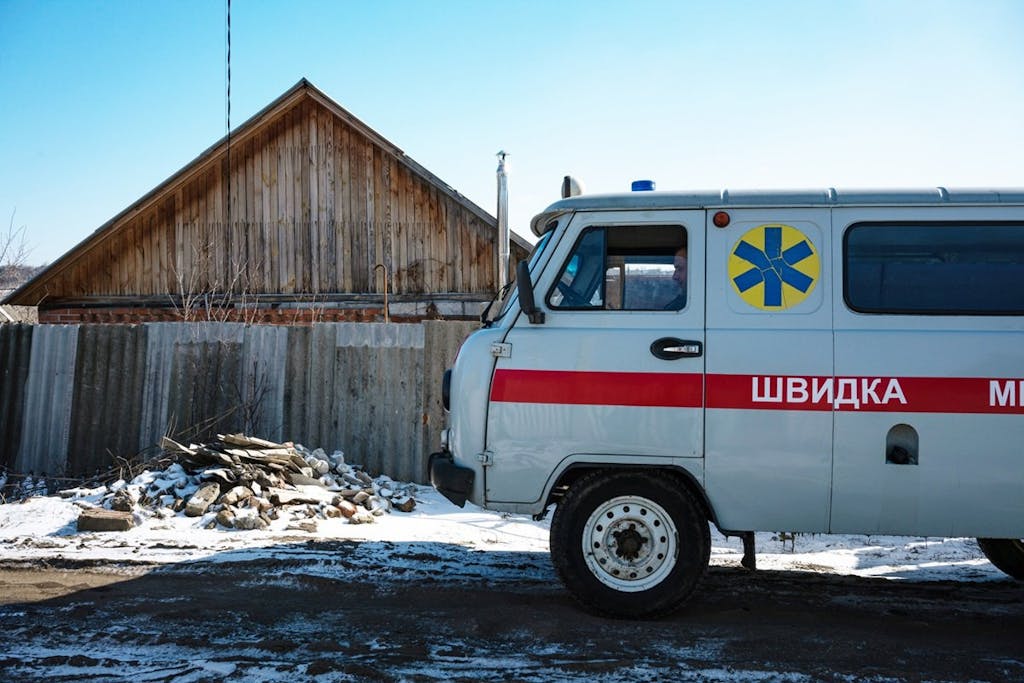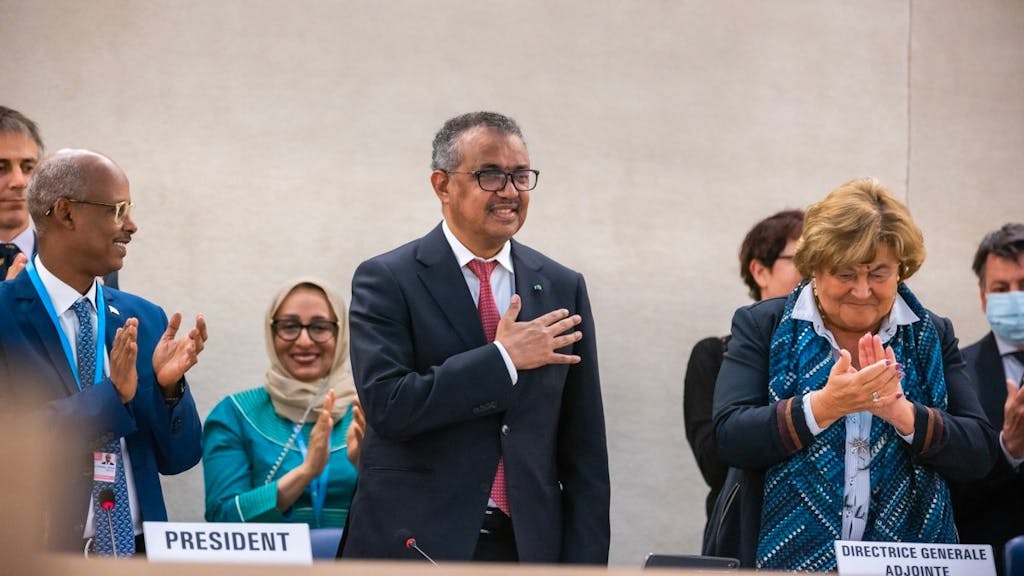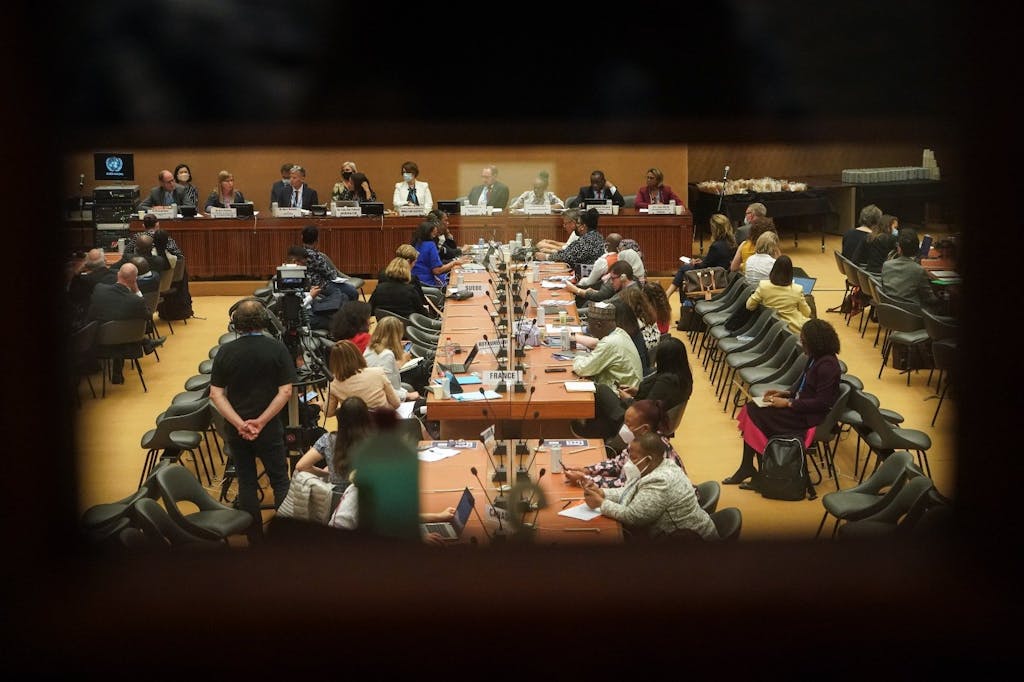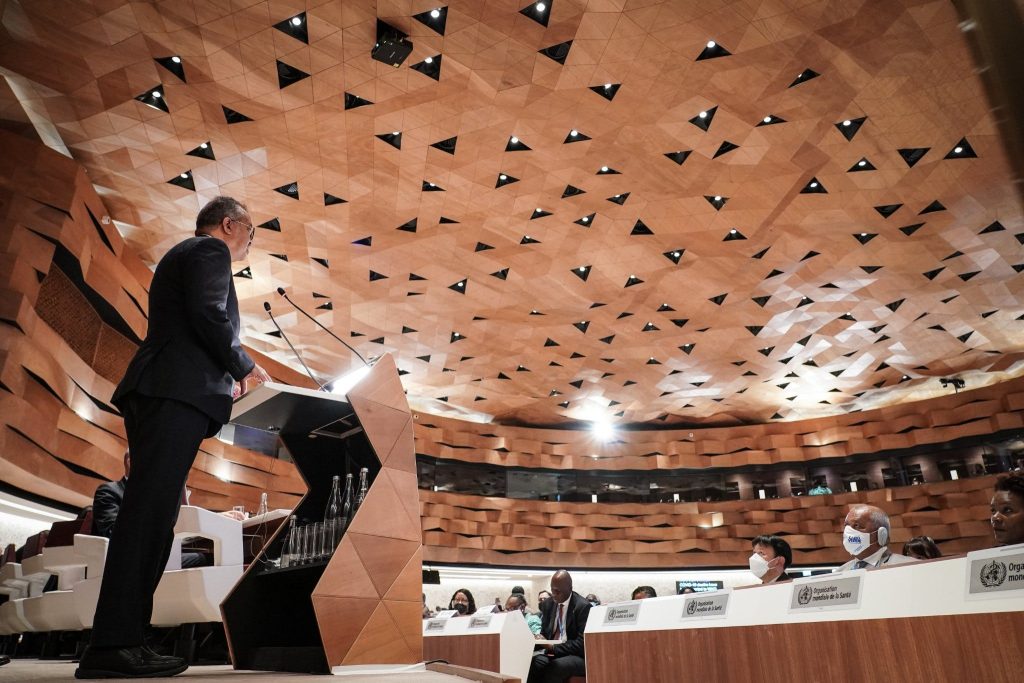
WHO Director-frequent, Dr. Tedros Adhanom Ghebreyesus, delivers his opening speech on the seventy fifth World well being meeting. photograph: L. Cipriani/ WHO
For the primary time as a end result of the COVID-19 pandemic started, Member State delegates, worldwide well being specialists, and civil society representatives gathered in Geneva for the World well being meeting. Breakthroughs on prolonged-standing factors and pressing priorities — from fixing the group’s damaged financing to making ready for future well being threats — marked the second.
well being for Peace, Peace for well being
the outcomes of battle have been extreme of thoughts on the seventy fifth World well being meeting (WHA75) as a end result of the battle in Ukraine continues to take a devastating toll on the effectively-being of tens of millions of people. primarily based on this yr’s theme, well being for Peace and Peace for well being, the meeting noticed a quantity of pivotal moments associated to well being and battle.
Of particular word, the meeting voted on a decision put forward by Ukraine condemning Russia’s army aggression in opposition to Ukraine, collectively with assaults on well being care services. The decision additionally describes the aggression as becoming “distinctive circumstances” — that means that the meeting might probably droop Russia’s voting privileges and companies. The decision handed with 88 Member States voting in favor, whereas 12 voted in opposition to and fifty three abstained. Russia put forth an identical decision expressing concern for well being situations and assaults on civilians in Ukraine with out naming an aggressor. That decision failed.
all by the meeting contributors have been reminded of the bodily and psychological well being impacts of violence and battle, which exacerbate current vulnerabilities and plague communities in every nook of the world. Member States’ remarks highlighted that the worldwide neighborhood is deeply involved regarding the knock-on outcomes of conflicts, particularly the unfold of infectious illness, growing local climate vulnerabilities, and worldwide meals insecurity and malnutrition, to which the African continent is very weak.

A WHO-supported cell psychological well being group car is parked on the highway all by a house go to with former affected person in Bylbasivka, Ukraine. The group travels to distant areas inside the Donetsk area to ship specialised psychological well being care to sufferers who wouldn’t have entry. photograph: Blink Media – Brendan Hoffman/ WHO
European Regional Director Hans Kluge additionally underscored the vulnerability that women and kids, particularly women, face in battle-affected nations and warranted Member States that the prevention of sexual exploitation, abuse, and harassment is on the center of the World well being group’s response in Ukraine and neighboring nations. Safeguarding measures, resembling these outlined inside the WHO administration Response Plan for stopping and responding to sexual exploitation and abuse, have been put in place and the area has appointed 5 focal factors for diverse points of the response.
Reelection of the WHO Director-frequent
working uncontested, WHO’s Director-frequent Dr. Tedros Adhanom Ghebreyesus was reelected to a second 5-yr time period, which might conclude in August 2027. Dr. Tedros acquired 27 nominations from nations in all six WHO areas; usually, candidates acquire simply one nomination. In remarks after the election, Dr. Tedros expressed gratitude. “I’m actually, actually overwhelmed by your assist and your notion. This recognition is simply not solely for me. By and large, it is recognition for all of the WHO household … i want to understand … their exhausting work and provides consideration to the subject of serving humanity,” he said.

Dr. Tedros Adhanom Ghebreyesus stands in gratitude immediately after Member States re-elected him to serve a second 5-yr time period as Director-frequent of the WHO. photograph: WHO
Sustainable financing for WHO
The vexing subject of prolonged-overdue reforms to WHO’s flawed financing construction was extreme on the WHA75 agenda. the arrival of the COVID-19 pandemic compelled Member States to reconcile their outsized expectations of the agency with their meager and extremely conditional monetary contributions. In a galvanizing second on the primary day of the meeting, the UN basis delivered a letter signed by over seventy five organizations and advocates throughout the globe urging delegates to undertake measures to restore WHO’s damaged financing mannequin.
Member States stepped up all by WHA75 in a historic choice to enhance member dues, referred to as assessed contributions, to signify 50% of WHO’s base funds by 2030-2031. Assessed contributions presently make up solely sixteen% of the backside funds, forcing the agency to function with unpredictable and inflexible voluntary contributions.
altering the financing construction is important for WHO to recruit and retain extreme expertise, enhance funding flows to the nation diploma, and be sure that funds allocations are primarily based on scientific proof and programmatic want. Pending future approval by Member States, utterly the greenback quantity going to WHO by assessed contributions will enhance by $600 million earlier than 2030. extra importantly, although, the various taken at WHA75 will enhance the situations beneath which money flows to the group.
Member States might additionally think about a replenishment mannequin to finance the the rest of the backside funds and to decide a Member State job group to oversee ongoing reforms to WHO’s transparency, effectivity, accountability, and compliance efforts.
Future work on preparedness for well being emergencies
as a end result of the earliest days of the COVID-19 pandemic, Member States, well being organizations, and most of the people have scrutinized the processes and guidelines that govern worldwide well being responses to pandemics. The worldwide well being guidelines (IHR), first negotiated in 1968 and most recently modified in 2005 in response to the H5N1 avian influenza, have been fastidiously examined by the Working Group on Strengthening WHO Preparedness and Response to well being Emergencies (WGPR). although a quantity of amendments to the IHR have been proposed by Member States, simply one modification to Article fifty nine, to shorten the timeframe for future amendments to take impression, was thought of for adoption at this yr’s meeting.

all by this yr’s World well being meeting, strategic roundtables launched collectively delegates, specialists from WHO, associate businesses and civil society to debate current priorities and subsequent options on very important worldwide public well being factors. photograph: L. Cipriani/ WHO
After a lot deliberation, the modification, submitted by the usa, was adopted by consensus. The change will make the IHR a extra agile authorized instrument, indicating Member States’ dedication and constructing a strong basis for the future efforts of a Member State-led Working Group on IHR, which might proceed deliberating on adjustments to the guidelines over the following two years.
whereas the meeting formally closed on Saturday, might 28 the WHO govt Board met on might 30 for its conventional publish-WHA meeting. on the meeting, Member States agreed unanimously to decide a Standing Committee on well being Emergency (Pandemic) Prevention, Preparedness and Response. The panel will enhance oversight of WHO’s work in emergencies — recurrently monitoring and assessing efficiency and serving to guarantee a faster, extra environment nice response when a Public well being Emergency of worldwide Concern is said.
What’s subsequent?
After a packed weeklong agenda, WHA75 ended with clear wins — with a path forward for sustainably financing WHO chief amongst them. The meeting additionally paved the most interesting strategy for a nimbler response all by worldwide well being emergencies and firmly acknowledged the well being impacts of current conflicts on Ukraine, neighboring nations, and the world.
WHA75 delivered broad settlement that the world wants a stronger WHO and assist for a better plan to handle well being crises, plus an superior vote of confidence for the Director-frequent. Now it’s as a lot as worldwide leaders to grab the second, construct on the progress, and ship on the promise of well being for all.


